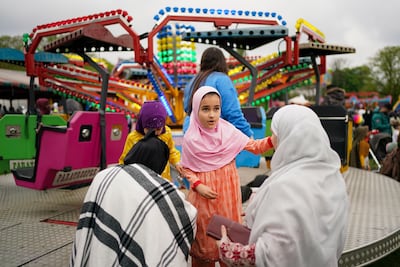When Andrew Leak, 66, threw petrol bombs at a migrant centre in the UK last month, it hit a particularly raw nerve for me. In his final tweet, he said he planned to “obliterate Muslim children.” As a Muslim mother of two young girls, I reacted as any other parent would: with horror, fear and shock – but also with the added fear of living in a particular set of crosshairs simply for being Muslim. After all, what he did was eventually described as terrorism because the aim is precisely to engender terror. But several days passed until this act was clearly identified as such.
To make it even more terrifying, his tweet addressed Muslim women and warned of awful consequences, saying “disgusting women will be targeted". We should let that sink in. He wanted to eradicate children for being Muslim. He also declared that Muslim women should be burnt alive.
That is Islamophobia. Yet, there is no "official" definition of Islamophobia. But that is the thing about hatred, discrimination and inequality: we can sense it and know it is inherently wrong but it is much harder to put a name on it so as to be able to tackle it. Tackling hatred comes with huge resistance from people and groups who actively perpetuate hate, such as the sources that Andrew Leak had been influenced by, and those who, under a veneer of propriety, perpetuate toxic ideas. It also comes from those who imbibe pervasive attitudes of negativity and are yet unaffected personally.

Creating a definition acknowledges that a situation exists and it is wrong. And once there is agreement about its existence and its wrongness, those perpetuating it must be held to account.
Think of slavery, segregation, apartheid, racism, misogyny and other social and cultural ills. Naming them identifies the problem and helps tackle them with the ultimate goal of removing these problems from societies. This has been and in some cases, continues to be a struggle today.
November is marked as Islamophobia Awareness month, and is now in its tenth year. This year’s theme is “tackling denial”. It is vital to raise awareness that Islamophobia is an actual thing, and that it is wrong – the wrongness absolutely does need to be clearly articulated. Because the ultimate goal must be to eradicate Islamophobia. To that end, the UN has announced that March 15th 2023 will be the first ever day to combat Islamophobia.
Eradication must be the goal, but simply to tackle denial and get recognition is a mammoth task. The All Party Parliamentary Groups on British Muslims released a definition in 2019, after extensive consultation with a broad group of experts, academics, civil society actors and policymakers: “Islamophobia is rooted in racism and is a type of racism that targets expressions of Muslimness or perceived Muslimness.”
While there was much discussion about the right definition, in order to tackle a problem you must have at the least a starting point. The most surprising responses have been and continue to be the denial that Islamophobia is even a thing.
So the first step is to identify what those coded forms of resistance are. Some are rooted in semantic pedantry, that a "phobia" is supposed to be an irrational fear of something, and some people maintain the absurd claim that it is rational to be fearful of Muslims. Others still try to deflect any articulation of the hatred that Muslims experience, by saying that having a definition of Islamophobia will shut down critique of Islam as a religion.
But this group of people are disingenuous because they do not acknowledge that the hatred against people is real. If they genuinely wanted to make a distinction they should offer alternatives.
Some say incorrectly that Muslims are the cause of terrorism and therefore Muslims should collectively face restrictions and even endure violence, abuse and hatred. Clearly some extremist Muslims do carry out acts of horrific violence. Studies, however, consistently show that perpetrators of terrorism are more likely to be from the far right than Muslims. And irrespective of this, it is not justification for dehumanisation and punishment.
Islamophobia can vary from war crimes and genocides, to the almost imperceptible microaggressions of daily life. The latter are particularly noxious and can often lead to accusations of "playing the victim" when Muslims call them out. But the fact is that Muslims suffer discrimination, violence and abuse. For the denial of this reality to be couched as rational, reasonable or even dismissed can itself be Islamophobic as it undermines the notion that that Muslims have the right to live their lives just like anyone else.
It will be a long road to the ultimate goal of eradicating Islamophobia. We need to map out the population and know where their attitudes are entrenched, where there is room to change minds. A definition will help people simply to know this is going on. It will help lawmakers use the power of the law to make changes, and for behavioural scientists to examine how to change attitudes and behaviours. The first small step of our ultimate societal goal to eradicate Islamophobia is to raise awareness that it exists, that it is wrong, and therefore we must do something about it.


